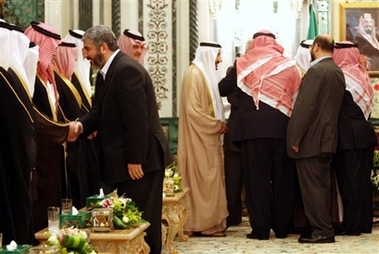Palestinians reach deal on power-sharing
(AP)Updated: 2007-02-09 09:08
MECCA, Saudi Arabia - Rival Palestinian factions signed a power-sharing accord aimed at ending months of bloodshed Thursday, agreeing that the Islamic militant group Hamas would head a new coalition government that would "respect" past peace agreements with Israel.
 Hamas leader Khaled Mashaal, left, shakes hands in Mecca, Saudi Arabia, Thursday, Feb. 8, 2007. [AP]  |
US and Israeli acceptance is crucial to the deal's success. Unless they are convinced Hamas has sufficiently moderated, the West is unlikely to lift a crippling financial blockade of the Palestinian government, and it will be difficult to advance the peace process.
"Israel expects a new Palestinian government to respect and accept all three of the international community principles - recognition of Israel, acceptance of all former agreements and renunciation of all terror and violence," Israeli government spokeswoman Miri Eisin told The Associated Press after the accord was announced.
She would not say whether Israel believes the guidelines of the new government fulfill those demands.
In Washington, State Department deputy spokesman Tom Casey said "we'll see what any final agreement actually looks like and we'll have to make an evaluation from there" as to whether it meets international demands.
Palestinians hope the agreement will avert an outright civil war. Hamas and Fatah gunmen have clashed repeatedly in recent months, killing dozens - including 30 who died in four days of fighting that ended with a fragile truce Sunday. The deal could also fall apart as the two sides work out who will fill sensitive posts in the new government - particularly the interior ministry, which controls security forces.
Saudi Arabia - which put its credibility on the line by hosting the high-profile summit in the holy city of Mecca - will likely now face the task of selling the agreement to its ally, the United States.
To boost the new government, the kingdom promised $1 billion in aid to the Palestinians, according to Ahmed Youssef, a political adviser to Prime Minister Ismail Haniyeh of Hamas, speaking in Gaza.
Palestinian President Mahmoud Abbas, of Fatah, and Hamas leader Khaled Mashaal headed two days of intense negotiations in a Mecca palace overlooking the Kaaba, Islam's holiest shrine - a venue Saudi Arabia chose to step up the pressure on the two sides to compromise.
Much of the negotiations centered on a single word. Abbas pressed Hamas to accept the stronger stance of "committing to" past peace accords with Israel signed by the Fatah-dominated Palestinian Liberation Organization. But in the end, he was forced to settle for the promise to "respect" them.
The final agreement was announced at a ceremony aired live on Arab television Thursday night, in which Saudi King Abdullah sat with Abbas on his right and Hamas leader Khaled Mashaal on his left.
Abbas aide Nabil Amr read a letter from Abbas proclaiming the accord and asking Haniyeh of Hamas to form the new coalition government within five weeks, divvying up Cabinet posts between the factions according to a formula agreed on in the Mecca talks.
Abbas and Mashaal insisted the agreement would bring peace between their factions and lavished praise on the Saudi monarch for his help - even comparing him to the Prophet Muhammad in his ability to bring reconciliation.
The Palestinian president said the deal would "satisfy our people ... and bring us to the shores of peace ... This initiative has been crowned with success."
Mashaal vowed the accord would put an end to violence after a series of truces between Fatah and Hamas gunmen that collapsed.
"I tell those who fear that the fate of this agreement will be the same fate of the old ones, ... we have pledged our allegiance to God from this sacred place .... and we will go back to our country fully committed to it."
"I say to our young people that this is an agreement of the leadership of the
biggest groups and none of you should accept any order from others to fire," he
said.
| 1 | 2 |  |
|
||
|
||
|
|